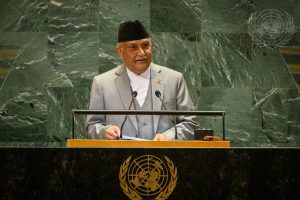On October 22, Nepal’s current government completed its first 100 days in office. The coalition between the Communist Party of Nepal-Unified Marxist Leninist (CPN-UML) and the Nepali Congress came into power amid a shifting geopolitical landscape characterized by conflicts, including the Israel-Gaza war and the Russia-Ukraine war. The new government faced the challenge of rescuing Bipin Joshi – a Nepali citizen captured by Hamas during the October 7 attack – and repatriating Nepali citizens serving in the Russia-Ukraine war. Like its predecessors, the current government also needed to continue balancing Indian, Chinese, and U.S. interests in Nepal.
In Nepal – where domestic issues and political changes are often blamed on external meddling – a government’s foreign relations serve as an important indicator of future stability. The current government’s performance thus far signals a deliberate effort to balance foreign interests and remain in power.
In September, Prime Minister K.P. Sharma Oli and Foreign Minister Arzu Rana Deuba attended the United Nations General Assembly in New York. The trip, which marked Oli’s first foreign visit since assuming office, featured meetings with several heads of government.
Notably, Oli met with Indian Prime Minister Narendra Modi – an opportunity for the leaders to build trust and normalize ties. The previous tenure of Oli – who is touted to be “pro-China” – saw diplomatic rifts emerge between the neighbors over border issues. Oli’s return to power thus had raised doubts regarding Nepal’s long-standing ties with India. His meeting with Modi, however, signaled a step toward rapprochement.
The meeting between Oli and Modi built on Deuba’s visit to India in August. The trip – undertaken at the invitation of Indian Minister of External Affairs S. Jaishankar – marked Deuba’s first official bilateral visit since she assumed the foreign minister post. Several experts noted that this visit was a “high-profile affair,” highlighting that Deuba’s engagements resembled those undertaken by former Nepali prime ministers. While some experts contended that this visit demonstrated New Delhi’s commitment to further strengthening Nepal-India ties, others argued that the importance accorded to Deuba, who belongs to the Nepali Congress, ended up creating more mistrust between Oli (the leader of the CPN-UML) and New Delhi.
Nevertheless, continued positive engagements have appeared to bode well for bilateral ties.
Oli and Deuba’s UNGA visit also served as an opportunity to strengthen ties with the United States, which has emerged as an important foreign power in Nepal’s political dealings.
Following her attendance at UNGA, Deuba visited Washington, D.C., where Nepal and the United States signed a Bilateral Consultation Mechanism MoU with John Bass, under secretary for political affairs of the U.S. Department of State, as a signatory. Deuba deemed the agreement – which aims to facilitate cooperation in areas such as trade, investment, tourism, and infrastructure – “a historic milestone” in Nepal-U.S. ties.
Oli and Deuba’s U.S. trip did not yield any major outcomes for Nepal’s relations with another key foreign power: China. However, the current government has continued to build ties with its northern neighbor.
Most recently, a Chinese Communist Party (CCP) delegation visited Kathmandu to brief Nepali political party leaders on the Third Plenary Session of the 20th CCP Central Committee. The “rare party briefing” was led by Chen Gang, secretary of the CCP Qinghai Provincial Committee. During his visit, Chen held meetings with top political leaders, including Nepali Congress President Sher Bahadur Deuba and Communist Party of Nepal-Maoist Center Chairman Pushpa Kamal Dahal.
Notably, Chen also met Oli, who assured him that no anti-China activities will be allowed in Nepal and reaffirmed Nepal’s commitment to the “One China” policy. This, in addition to Oli’s decision to make China the site of his maiden official bilateral visit, demonstrated the current government’s continued dedication to strengthening relations with its northern neighbor.
Given these developments, it appears that the current government has made a conscious effort to balance three influential foreign players: China, India, and the United States. Of course, issues remain. Observers point to the stalling of 120 micro- and medium-level hydropower projects due to Indian delays in supplying explosives – a development they attribute to New Delhi’s “unease” with China’s expanding presence in Nepal’s hydropower sector.
Nevertheless, the current government has fared well in leveling Indian, Chinese, and U.S. interests in Nepal.
The government’s handling of the Israel-Gaza war and the Russia-Ukraine war, however, has not been as successful. Bipin Joshi remains in Hamas custody and 40 Nepalis have died in the Russia-Ukraine war, with Nepalis reportedly continuing to enlist in the Russian Army.
It is important to note that this is not from a lack of effort.
Addressing the Ministerial Meeting of the Non-Aligned Movement at UNGA, Foreign Minister Deuba urged the global community to take initiatives for the safe release of Bipin Joshi.
The current government is engaged in diplomatic dialogue with Russia, and the Nepali Embassy in Berlin is working with the Ukrainian government to secure the release of Nepalis. In August, Deuba discussed the recruitment of Nepalis into the Russian army with Alexei Novikov, Russia’s ambassador to Nepal. As a result, 174 Nepalis in Russia have safely returned home.
The further success of these efforts, however, remains contingent on foreign cooperation and assistance.
The current government, though, has been credited with handling other foreign crises efficiently. Namely, over 1,300 Nepali students were rescued from Bangladesh following violent anti-government protests, with Deuba praised for her prompt response.
The current government’s performance on foreign policy so far has been well-received, with bilateral and multilateral engagements playing a constructive role in increasing Nepal’s visibility on international platforms and deepening ties with important partners. This paints a positive picture for the current government’s remaining tenure.
































